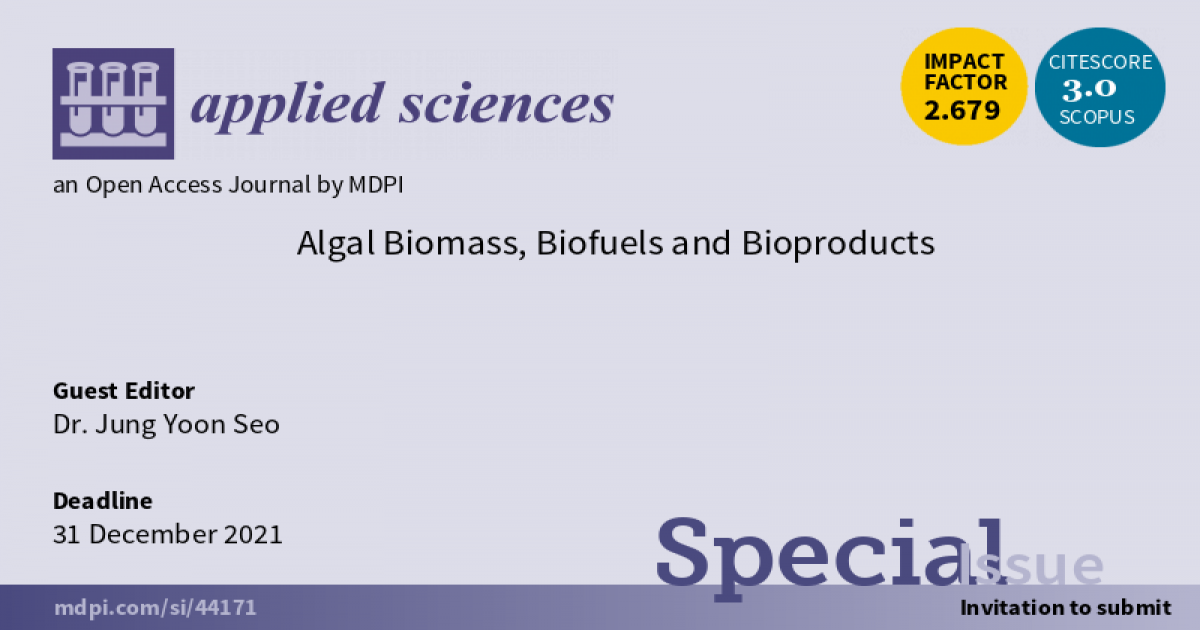Algal Biomass, Biofuels and Bioproducts
A special issue of Applied Sciences (ISSN 2076-3417). This special issue belongs to the section "Environmental Sciences".
Deadline for manuscript submissions: closed (31 December 2021) | Viewed by 8234

Special Issue Editor
Interests: microalgae biorefinery; microalgal-based biofuels; microalgal-based bioproducts; microalgal-derived materials; bioenergy strategy; climate technology policy
Special Issue Information
Dear Colleagues,
As the global climate change crisis becomes serious, the importance of climate technologies to reduce CO2 emissions is growing exponentially. Bioenergy, one of these aforementioned climate technologies, is a carbon-neutral energy source that can reduce reliance on fossil fuels in various fields such as fuels, electricity, heat, chemicals ,and products. Microalgae biomass is the promoting candidate for application to production of biofuels and bioproducts owing to the inherent properties of high growth rates, useful components, non-edible oil crop, carbon neutrality, easy environmental adaptability, and a wide applicability for end-products.
In this context, many studies have been performed on the development of cost-competitive microalgal-based biofuels and bioproducts. Notwithstanding the extensive efforts devoted to the commercialization of those, the related existing technologies still leave much to be desired. For instance, there are complicated and less mature downstream processes and lower cost competitiveness compared to other promising renewable or conventional alternatives. The aim of this Special Issue is therefore to discuss various approaches that contribute to increase technology maturity and cost competitiveness of algal biomass, biofuels, and bioproducts. The topics of interest for this Special Issue include but are not limited to the following:
- Innovative microalgae biorefinery;
- Promising downstream processing of microalgal biomass;
- Conventional application fields of algal biomass (biofuels, biochemical, bioproducts);
- New emerging application fields (microalgal-derived materials (ex. electrode materials, catalysts));
- Strategic and policy support plan for algal-based bioenergy.
Guest Editor
Manuscript Submission Information
Manuscripts should be submitted online at www.mdpi.com by registering and logging in to this website. Once you are registered, click here to go to the submission form. Manuscripts can be submitted until the deadline. All submissions that pass pre-check are peer-reviewed. Accepted papers will be published continuously in the journal (as soon as accepted) and will be listed together on the special issue website. Research articles, review articles as well as short communications are invited. For planned papers, a title and short abstract (about 100 words) can be sent to the Editorial Office for announcement on this website.
Submitted manuscripts should not have been published previously, nor be under consideration for publication elsewhere (except conference proceedings papers). All manuscripts are thoroughly refereed through a single-blind peer-review process. A guide for authors and other relevant information for submission of manuscripts is available on the Instructions for Authors page. Applied Sciences is an international peer-reviewed open access semimonthly journal published by MDPI.
Please visit the Instructions for Authors page before submitting a manuscript. The Article Processing Charge (APC) for publication in this open access journal is 2400 CHF (Swiss Francs). Submitted papers should be well formatted and use good English. Authors may use MDPI's English editing service prior to publication or during author revisions.
Keywords
- microalgae
- microalgae biorefinery
- microalgal-based biofuels
- microalgal-based bioproducts
- microalgal-derived materials
- bioenergy strategy
Benefits of Publishing in a Special Issue
- Ease of navigation: Grouping papers by topic helps scholars navigate broad scope journals more efficiently.
- Greater discoverability: Special Issues support the reach and impact of scientific research. Articles in Special Issues are more discoverable and cited more frequently.
- Expansion of research network: Special Issues facilitate connections among authors, fostering scientific collaborations.
- External promotion: Articles in Special Issues are often promoted through the journal's social media, increasing their visibility.
- e-Book format: Special Issues with more than 10 articles can be published as dedicated e-books, ensuring wide and rapid dissemination.
Further information on MDPI's Special Issue policies can be found here.





